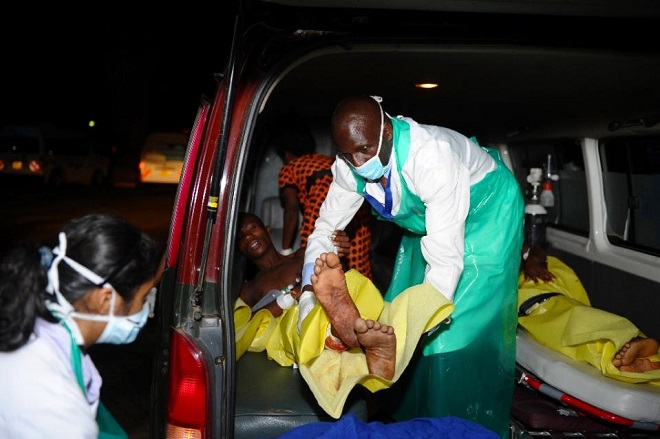Somalia calls for closer security ties after ‘barbaric’ Kenya massacre
Garissa (Kenya) (AFP) – Somalia and Kenya must boost security cooperation between them, Somali President Hassan Sheikh Mohamud said Friday, as he offered his condolences a day after “barbaric” Islamist gunmen massacred 147 students.
Mohamud said he mourned the “lives of innocent students” killed in the university in the northeastern Kenyan town of Garissa, offering his “condolences to the families of those who have died in this attack by the merciless terrorists.”
Masked gunmen from Somalia’s Shebab Islamist group killed the Kenyan students Thursday in a day-long college campus siege, the country’s deadliest attack since the 1998 US embassy bombings.
All four of the gunmen wore suicide vests packed with explosives, detonating themselves in huge blasts as the dramatic assault finally ended after some 16 hours.
Hurling grenades and firing automatic rifles, the gunmen had stormed the university in the northeastern town of Garissa at dawn as students were sleeping, shooting dead dozens before setting Muslims free and holding Christians and others hostage.
The government said at least 79 people were wounded in the assault near the lawless border with war-torn Somalia, several seriously, and there are fears the death toll may still rise.
In the final hour before darkness fell, Kenyan troops stormed a student dormitory where the gunmen were holed up as blasts and fierce gunfire rang out.
Interior Minister Joseph Nkaiserry said the four died detonating their suicide vests as soldiers burst in shooting, with Western security sources reporting that several soldiers and hostages may have died in the final blasts.
Troops then continued to search the campus for any possible insurgents until the siege was declared over late on Thursday, with the national disaster operations centre saying it had “ended with all four terrorists killed.”
The attack was claimed by Al-Qaeda-linked Shebab fighters, the same insurgents who carried out the Westgate shopping mall massacre in Nairobi in September 2013, when four gunmen killed at least 67 people in a four-day siege.
Shebab spokesman Sheikh Ali Mohamud Rage told AFP the gunmen had taken non-Muslims hostage, and that their mission had been “to kill those who are against the Shebab.”
– Senseless and barbaric –
The university siege marks the worst attack on Kenyan soil since the 1998 bombing of the US embassy in Nairobi by Al-Qaeda, when 213 people were killed by a huge truck bomb.
The United States condemned Thursday’s attack in the “strongest terms”, while UN Secretary-General Ban Ki-moon called for those responsible to “be swiftly brought to justice.”
British Minister for Africa James Duddridge called the killings “senseless” and “barbaric”, while the French presidency said it stood “ready to work” with Kenya in its fight against terrorism.
It was not clear if any of the students the Shebab said they had held were alive at the time of the final assault by troops. However, officials said over 500 students had been rescued from the fighting.
“Kenya is at war with Somalia,” Rage said, referring to the thousands of Kenyan troops in Somalia as part of an African Union military mission.
Soldiers with tanks were deployed around the campus.
A $215,000 (200,000 euro) bounty was offered for the capture of alleged Shebab commander Mohamed Mohamud, a former Kenyan teacher believed to now be in Somalia and said to be the mastermind behind the Garissa attack.
The garrison town is around 150 kilometres (90 miles) west of Somalia and has been targeted in the past by militants from the Shebab.
– ‘Gunmen shot indiscriminately’ –
Police chief Joseph Boinet said “the gunmen shot indiscriminately” after storming the compound.
The sprawling campus on the outskirts of town has both teaching areas as well as residential blocks.
The university has several hundred students from different parts of Kenya, and the first bodies of some of those killed were flown to Nairobi late Thursday for families to collect on Friday, the start of the Easter weekend, a major holiday in the country.
A dawn until dusk curfew has been imposed on several northern and eastern Kenyan districts for two weeks.
Kenya has been hit by a wave of grenade and gun attacks, often blamed on sympathisers of the Shebab and sometimes aimed at police targets, since the army crossed into southern Somalia in 2011 to attack Islamist bases.
A series of foreign travel warnings in response to the threat have crippled Kenya’s economically important tourism industry.
On Wednesday, just hours before the Garissa attack began, President Uhuru Kenyatta said Kenya “is as safe as any country in the world.”
On Thursday, he offered his condolences to those killed but said security forces had made the “appropriate deployment to the affected area.”
He also ordered the “urgent” enrolment of a planned 10,000 police recruit boost, warning Kenya had “suffered unnecessarily due to shortage of security personnel.”
Kenya’s government has been under fire since the Westgate attack. In June and July last year Shebab gunmen killed close to 100 people in a series of attacks on the town of Mpeketoni and nearby villages.
In November, the Shebab claimed responsibility for holding up a bus outside Mandera town, separating passengers according to religion and murdering 28 non-Muslims. Ten days later 36 non-Muslim quarry workers were also massacred in the area.





